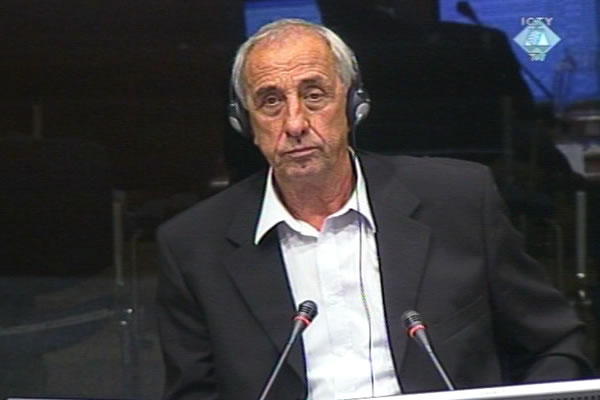Home
WHERE THERE USED TO BE 90 PERCENT SERBS, NOW THERE WERE 90 PERCENT CROATS
Former Knin mayor Petar Pasic claims that the demographic composition of Knin drastically changed after Operation Storm. The number of Serbs dropped from 90 to only five to eight percent. At the same time, the number of Croats rose from eight to 90 percent but Pasic contends that the Croatian authorities were not to blame
 Petar Pašić, svjedok odbrane Ivana Čermaka
Petar Pašić, svjedok odbrane Ivana Čermaka As his cross-examination continues, former Croatian government commissioner for Knin Petar Pasic tried to protect the former Knin Garrison commander Ivan Cermak. Pasic is testifying as Cermak’s defense witness. In his cross-examination by prosecutor Gustafson, Pasic said that after Operation Storm the accused general dealt with ‘civilian issues only and not in any way with the tasks of the army and police’. Cermak is on trial together with generals Gotovina and Markac for crimes against Serb civilians and their property in Krajina in the summer and fall of 1995.
Pasic admitted that after the arrival of the Croatian Army and police the demographic composition in Knin changed drastically. The number of Serbs dropped from 90 percent to just five to ten percent. At the same time, the percentage of Croats rose from eight to 90. The witness contends that the Croatian leadership was not to blame for it. According to the witness, after Operation Storm there were no obstacles for the Serbs to return to Krajina. On the first day of his testimony, Pasic claimed that the Serbs’ ‘self-proclaimed leaders’ were responsible for the exodus of the Serb population.
The prosecution showed a report drafted by Elisabeth Rehn, the UN special rapporteur for human rights. Rehn’s report claimed that the return of Serbs was virtually impossible: according Croatian laws passed at the time, the Serbs’ property would be seized if they failed to come to Croatia by a certain deadline. At the same time, the Serbs were denied documents they needed to enter Croatia. The witness said he disagreed with the assessment, because he ‘cannot put more trust in the special rapporteur than in the Croatian authorities’. This prompted the prosecution to show a report authored by a former member of the UN mission, where he says that in October 1995 the Knin mayor Petar Pasic told him that he disagreed with the Croatian government policy on the return of the Serbs. Pasic denied this, noting that he didn’t agree with the government policy which allowed everybody to come back. In Pasic’s opinion, those Serbs who had committed crimes in Krajina should not have been allowed to return.
In the second part of the hearing today, Gotovina’s defense counsel Misetic re-examined the witness. Misetic tried to contest Pasic’s claim that the former Split Military District commander attended receptions where songs about former Ustasha leaders Jure Francetic and Rafael Boban were sung. Misetic showed recordings made at two ceremonies in Knin, one at the castle in August 1995 and the other in the elementary school in December 1995. Gotovina attended the two ceremonies. The song about Jure and Boban was not sung there. Pasic’s reply made it clear that he had in mind other events: concerts in the Officers’ Hall in Knin. The song was performed there in the presence of the accused general.
Pasic argued that his 2002 statement in which he had accused the Croatian leadership of expelling Serbs from Krajina didn’t contain his words but the words of the OTP investigators. This prompted the defense counsel to show a video recording of an interview between an OTP representative and former interior minister Jarnjak. In the interview conversation, Jarnjak was asked leading questions a number of times. Pasic replied that the same had happened to him. According to Pasic, the investigators confronted him with a number of claims and he mostly agreed with them. Only later did Pasic realize that the claims were not true and he repudiated them in the statement he gave to Cermak’s defense.
Linked Reports
- Case : Gotovina et al. - "Operation Storm"
- 2009-10-09 USTASHA SONGS OR PATRIOTIC SONGS?
- 2009-10-08 ‘PLANNED CRIMES’ BECAME ‘ISOLATED INCIDENTS’
- 2009-10-07 PSYCHIATRIST BLAMES CRIMES ON PSYCHOPATHS
- 2009-10-14 WITNESS: CERMAK HAD NO AUTHORITY OVER POLICE
- 2009-10-15 "A SUPERIOR DOESN’T COOPERATE, HE ORDERS"
- 2009-10-29 POLICE MADE ARRESTS ONLY WHEN THEY DARED
